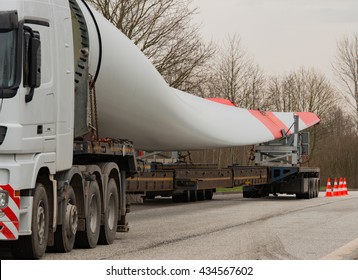The sudden announcement by a South Dakota manufacturer of wind turbine blades that it will be shutting its doors permanently by mid-August sent shock waves through the local community and raised questions about green energy’s promise to provide good-paying jobs for American workers.
More than 300 workers at Aberdeen, South Dakota-based Molded Fiber Glass (MFG) will lose their jobs when the plant closes.
Aberdeen is a city of 28,000 located in northeastern South Dakota.
In operation since 2007, the 325,000-square-foot plant has had a precarious existence. Ohio-based MFG threatened to shutter its South Dakota manufacturing plant in 2017, saying the looming expiration of a wind industry federal subsidy, known as the “production tax credit” (PTC), would undermine the plant’s profitability.
Thanks in no small part to the intervention of South Dakota’s Sen. John Thune (R), the PTC was extended as part of the 2017 tax reform bill, and the factory received a new lease on life.
Closing Despite Federal Subsidy
Enacted in 1992 as a “temporary” measure to help boost the wind industry, the PTC has faced expiration several times, only to be repeatedly extended by Congress.
Given the current composition of Congress and support by the Biden administration, the subsidy, scheduled to expire at the end of the year, is likely to be extended once again. Yet not even generous federal and state subsidies to the wind industry could save MFG’s Aberdeen manufacturing facility.
President Joe Biden, whose administration is aggressively steering the nation away from fossil fuels and towards increased reliance on renewable energy, told Congress earlier this year, “There’s no reason the blades for wind turbines can’t be built in Pittsburgh instead of Beijing.”
John Kerry, Biden’s special envoy for climate, said just a couple of months earlier, those losing jobs in the fossil fuel industry due to Biden’s policies will find they have a better choice of jobs in the solar or wind manufacturing or installation industries.
MSG’s workers aren’t benefitting from Biden’s big talk about promoting wind energy, said Thune in a statement sent to the press in response to the MFG’s announced closure.
“It’s troubling that at a time when wind energy is seeing record investment that this growth would not translate to American jobs, and it’s especially hard for these good-paying jobs in Aberdeen to again face uncertainty,” Thune said. “In his first address to Congress, President (Joe) Biden said, ‘There’s no reason the blades for wind turbines can’t be built in Pittsburgh instead of Beijing,’ and that, of course, should include Aberdeen.”
Blame Market Conditions, Competition
The factory’s closure was unavoidable, MFG said in a June press release announcing the August shut-down.
“The closure comes as a result of changes in market conditions, foreign competition, and proposed revisions to tax policies impacting the wind energy industry in the United States,” said MFG.
Seven of the world’s top ten wind turbine manufacturers are Chinese companies.
Employees were notified of the closure through a letter from the company.
“In an effort to maintain a viable operation, MFG has actively pursued alternate business opportunities during recent months, unfortunately without success,” MFG’s letter said.
Unstable Employment
Wind energy is politically popular, but it is likely to become less so as intermittency related electric power blackouts increase, says David Wojick, Ph.D., an international enegry consultant who writes for the Committee for a Constructive Tomorrow, which co-publishes Environment & Climate News.
“The wind industry now employs lots of people and wind farms are big tax shelters for the wealthy,” said Wojick. “These facts combine to make the production tax credit politically popular, supporting the spread of an ill-conceived power source.
“Tax credits look like real money, so it’s doubtful they will disappear until the blackouts get really bad,” Wojick said.
No one wants to see people lose their jobs, but the wind industry is untenable, a creation of big government, says Jay Lehr, Ph.D. a senior science analyst with CFACT.
“While it is always sad to see Americans lose their jobs, long-term, the wind industry in America will all one day collapse and make the country one huge sculpture park of abandoned factories and windmills,” Lehr said. “The industry only exists because of government subsidies and presently primarily supports Chinese industry.
“The biggest secret most do not realize is wind energy adds no net benefit to our electricity grids,” said Lehr. “One hundred percent of every wind facility’s output must be backed up with dependable coal, natural gas, or nuclear power kept as spinning reserve, ready to ramp up or down in seconds when the wind is not blowing at adequate speeds, or is blowing so erratically that the electricity generated must be regulated with power from other sources to ensure a consistent flow of electricity through power lines and transformers, a necessity for the proper functioning of the electric grid.”
SD’s Tough Energy Times
South Dakota’s prospects for becoming a bigger player in the energy sector have suffered two setbacks in recent months.
In addition to the MFG plant closure, the Biden administration’s decision to kill the Keystone XL pipeline means South Dakota and many other states will not benefit from having this now cancelled infrastructure project transport 800,000 barrels of oil a day from Alberta 1,700 miles south through their states to refineries on the Gulf Coast.
Bonner R. Cohen, Ph.D., (bcohen@nationalcenter.org) is a senior fellow at thee National Center for Public Policy Research and a senior policy analyst with CFACT.


























